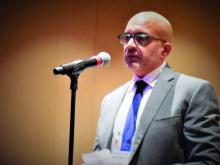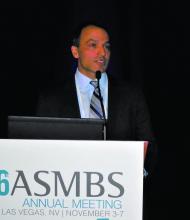LAS VEGAS – More than half the patients seeking laparoscopic sleeve gastrectomy at a pair of large U.S. programs tested positive for thrombophilia, and for most of these patients, their thrombophilia stemmed from an abnormally elevated level of clotting factor VIII. This thrombophilia seemed to link with a small, but potentially meaningful, excess of portomesenteric venous thrombosis that could warrant treating patients with an anticoagulation regimen for an extended, 30-day period post surgery, Manish S. Parikh, MD, said at a meeting presented by The Obesity Society and the American Society for Metabolic and Bariatric Surgery.
Although measurement of factor VIII excess can be done with a test that costs about $25, Dr. Parikh suggested that giving extended, 30-day anticoagulant prophylaxis to all patients undergoing laparoscopic sleeve gastrectomy (LSG) is a reasonable alternative to screening all patients first. “You could use our data to support 30-day prophylaxis for all LSG patients,” said Dr. Parikh, a metabolic and bariatric surgeon at NYU Langone Health in New York. He acknowledged that some logistic barriers can hamper the efficacy of extended prophylaxis.
The factor VIII elevations seen in many of these obese patients seeking metabolic surgery seems to be inherent and independent of their current weight. Although Dr. Parikh and his associates do not have long-term follow-up for all their LSG patients, “we’ve followed some patients, and their factor VIII is still elevated years later, after they’ve lost weight. We encourage lifelong anticoagulation [for these patients] because of their high risk for recurrent clot. This reflects their factor VIII and is independent of weight,” he said.
For their study, the researchers considered a factor VIII level above 150% of the normal level as abnormally elevated and prothrombotic.
The increased rate of portomesenteric venous thrombosis (PMVT) seen in the thrombophilic patients after LSG “is strongly related to the sleeve specifically,” added Dr. Parikh. He suggested that “something related to redirection of blood flow by taking the branches of the gastroepiploic arcade may lead to this.”
The interest of Dr. Parikh and his associates in thrombophilia and factor VIII excess began with a review they ran of more than 25,000 patients who underwent bariatric surgery at six U.S. centers during 2006-2016 that identified 40 patients who developed PMVT, all from the subgroup of nearly 10,000 patients who had LSG for their bariatric procedure. The prevalence of thrombophilia among those 40 patients with PMVT was 92%, with 76% having excess factor VIII (Surg Obes Relat Dis. 2017;13[11]:1835-9).
Based on those findings, the researchers began a practice of prospectively testing for thrombophilia in all patients who were assessed for LSG at two New York centers during August 2018–March 2019, a total of 1,075 patients, of whom 745 subsequently underwent the procedure. They tested the patients for factor VIII and four additional proteins in the clotting cascade that flag thrombophilia, a test panel that cost $103 per patient. That identified 563 surgery candidates (52%) with any thrombophilia, of whom 92% had excess factor VIII (48% of the total cohort of 1,075). Those patients received an extended, 30-day anticoagulant regimen.
To estimate the impact of this approach, the researchers compared the incidence of PMVT among the recent 745 patients who underwent LSG with a historic control group of 4,228 patients who underwent LSG at the two centers during the 4.5 years before routine thrombophilia screening. None of those 4,228 controls received extended anticoagulation.
During 30-day follow-up, 1 patient in the recent group of 745 patients (0.1%) developed PMVT, whereas 18 of the controls (0.4%) had PMVT. The incidence of bleeding was 0.6% in the recent patients and 0.4% in the controls. The researchers did not report a statistical analysis of these data, because the number of PMVT episodes was too small to allow reliable calculations, Dr. Parikh said. He also cautioned that the generalizability of the finding of thrombophilia prevalence is uncertain because the study population of 1,075 patients considering LSG was 84% Hispanic and 15% non-Hispanic African American.
Dr. Parikh had no disclosures.
SOURCE: Parikh MS et al. Obesity Week 2019, Abstract A109.


